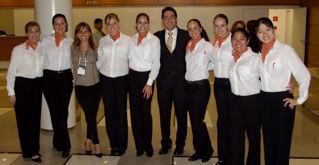Tuesday, August 19, 2008
Are There Other Strengths Assessment Tools?
Does anyone know whether there are any other assessment tools (than the Clifton StrengthFinder) based on Donald Clifton's Strengths Psychology or any other "strengths philosophy"?
Labels:
How to discover your strengths?
Subscribe to:
Post Comments (Atom)







8 comments:
A friend of mine found another assesment called the Via Inventory of Strengths survey created by Martin Seligman. I like this assesment for two main reasons it's FREE and has 24 strengths instead of 34, but each strength contains to other mini-strengths within each. But I still almost exclusively use StrengthsFinder.
I am hoping to use the Suvvey bcause it is free with my High School students this year.
http://www.viasurvey.org/
I love your blog. Check out mine below.
http://fuel4thejourney.blogspot.com/
BTW, do you know of any Strengths Studies with how to form improve teams through StrengthsFinder.
Thanks for all you do!
Sam Vara
Algebra/Geometry
Sandalwood High School
Jacksonville, Florida
Dear Sam
I think I have some material (studies, articles) about how to improve team work with strengths. Let me dig them out (you have just kick-started my Input talent!) and I will get back to you.
In the meantime, let me share with you a simple but useful tool to map talents of a group. Create a table with five columns: in the first column, you write the name of the team member, and in the next four columns, you write down their talents and put them into the four domains of talents: striving, relating, impacting and thinking.
To see which talents fall into which domain, check out the following blog site:
http://cliftonstrengthsfinder.blogspot.com/2007/01/strengths-finder-themes-categories.html
Please note that I have seen some talents appear in different domains. For example, Belief and Connectedness can be both striving talents as well as influencing talents. That is why one has to be careful with grouping them in this way.
But the table will still give you a nice overview of the "talent map" of your team.
One more thing. I believe that the question on how to use talents in teams touches another interesting point: are there talents which are better for a given organizational culture than others? I understand that the answer to this question according to the authors of the book "First Break All the Rules" is yes! For instance, they say that Discipline and Achiever are better fits for cultures that emphasize strictly following policies and guidelines. And Focus and Strategic are better for more entrepreneurial and independent cultures. Read more about this in page 99 "How Great Managers Find Talent". I would like to discuss this in more detail in another post that I am preparing!
I have developed an Assessment I call the Talent DNA Assessment. It gives you a report that describes your Drive, kNowledge and your Advantage. The Drive is how you feel and you were born with that, the kNowledge is how you think, learn and prefer to communicate and that develops usually by age 6. Your Advantage is what you do best and is more similar to the Talent Themes of the Strengths Finder. I believe that my assessment measures your foundational Talent DNA that is the basis for your Talent Themes. I have now interviewed thousands of people who have completed my assessment and I am convinced that the information you receive from my report will assist you in understanding how you are wired and how the people you live and work with are wired. I have used it in the last 10 years in my business to help entrepreneurs build successful business teams. If you are interested in learning more about it you can contact me at yourtalentcoach@sbcglobal.net
After Marcus Buckingham left Gallup, he wrote his book "Go Put Your Strengths to Work". It is interesting that this book does not include a code to do the Strengthsfinder online. As a consequence, the book does not make extensive use of the Strengthsfinder vocabulary of the 34 talents. Instead, it offers a series of brainteasers and exercises that allow you to directly discover your strengths (and not the talent "raw material" behind it). In my oppinion, it is probably the best book to learn more about developing talents into strengths.
Here is another interesting alternative to assessing your strengths, based on Howard Gardner's multiple intelligences theory. The test has 56 questions and takes about 5 or 10 minutes.
http://literacyworks.org/mi/assessment/findyourstrengths.html
I have recently read the great book "Management Teams - Why They Succeed or Fail" and "Team Roles at Work", both of them by the academic researcher R. Meredith Belbin. The book outlines a taxonomy of 9 different team roles: plant (creative), resource investigator, co-ordinator, monitor evaluator, teamworker, implementer, completer finisher and specialist. We usually have two or three preferred roles, around three "manageable roles", and the rest would be "least preferred roles".
The description of those nine team roles is full of language about strengths and "allowable weaknesses", and is therefore a very useful complement to the Clifton StrengthsFinder, which I have found more useful as a coaching tool for individuals rather than for understanding and building high-performance teams.
You can find more information about this on www.belbin.com, where you can also on-line assess your own team role profile for the cost of 30 british pounds.
Another great self-assessment tool can be purchased and done on www.careerleader.com, which costs around 90 USD but is money very well spent and complements nicely the StrengthsFinder report. I quote from the website:
In the early 1980s, Drs. Butler and Waldroop were colleagues at Harvard Business School and were feeling unsatisfied with the assessment instruments available at the time. They believed in the need for an assessment tool designed specifically for business students and professionals -- a mission that would ultimately lead to the launch of CareerLeader.
Their initial research was based on data from their collective work as independent career counselors, which was done in consultation with senior executives and organizations. This research led to the publication of their first book, "Discovering Your Career in Business", which is still in circulation today. Their research database has since grown to over half a million people, and still provides the foundation for the science behind today's CareerLeader program.
In 1998, they brought their self-assessment tool to the Internet, and CareerLeader as we know it today was born.
CareerLeader's stronghold in the marketplace is a testament to its adaptability from person to person, counselor to counselor, school to school, and company to company. It can be used by an individual independently, as well as within a structured counseling appointment. It can be used to help guide someone's career path either at the start – or midstream in a career. It can also be used to help retain top talent by sculpting a position to ultimately benefit both the employee and the company.
Drs. Butler and Waldroop remain actively engaged in research, as well as teaching, training and writing. They continue to evolve the CareerLeader program to better suit the needs in the marketplace, and to publish books and articles on various topics of career development.
Post a Comment